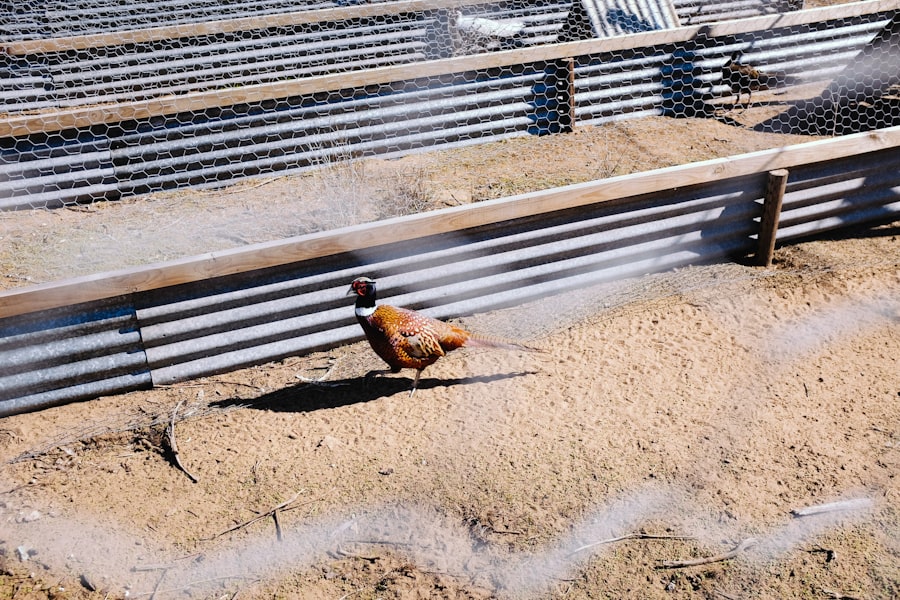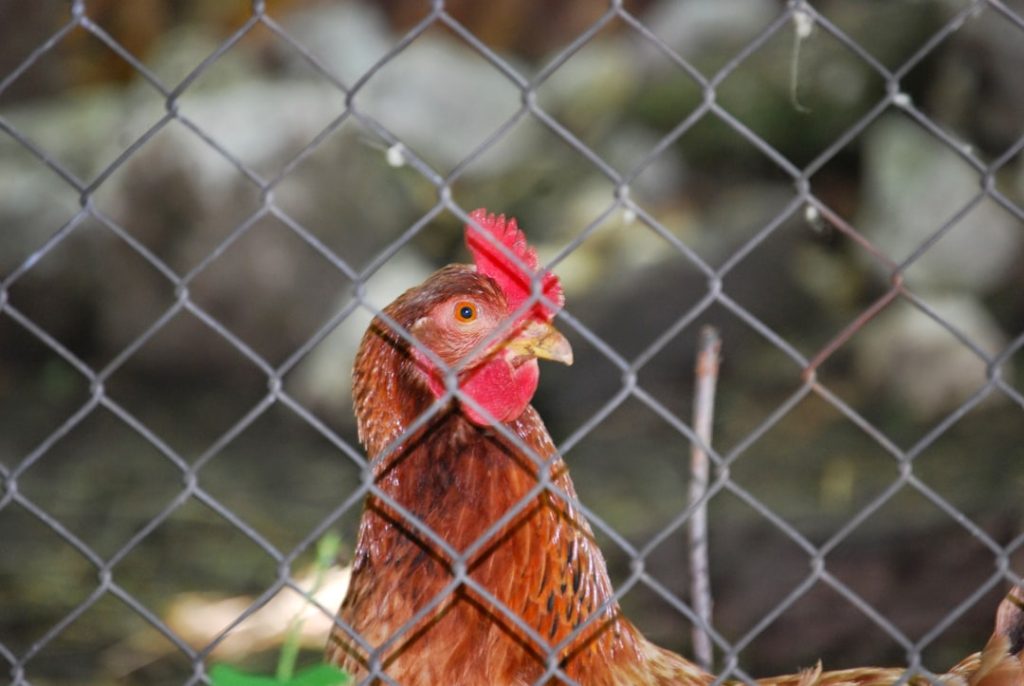Fencing is a crucial component for protecting gardens from various threats, including chickens. These birds can cause significant damage by scratching and pecking at soil, harming plants, and consuming vegetables. A proper fence acts as a physical barrier, preventing chickens from accessing the garden and safeguarding the gardener’s efforts and investments.
Beyond chicken protection, fencing also serves as a defense against other potential threats such as rabbits, deer, and various wildlife. It effectively deters unwanted visitors, preserving the garden’s integrity. Additionally, fencing can enhance the garden’s aesthetic appeal, adding structure and elegance to the landscape.
It defines boundaries and creates a sense of organization, contributing to the overall attractiveness of the outdoor space. In summary, fencing is essential for maintaining garden health and beauty while providing gardeners peace of mind that their plants are protected from harm. It serves multiple purposes, including protection, deterrence, and aesthetic enhancement, making it a valuable addition to any garden.
Table of Contents
- 1 Choosing the Right Type of Fencing for Keeping Chickens Out
- 2 Installing and Maintaining Your Chicken-Proof Fence
- 3 Other Methods for Protecting Your Garden from Chickens
- 4 Understanding the Behavior of Chickens and How to Deter Them
- 5 Creating a Safe and Comfortable Environment for Your Chickens
- 6 Finding a Balance Between Protecting Your Garden and Allowing Chickens to Roam
- 7 FAQs
- 7.1 What is fencing to keep chickens out of the garden?
- 7.2 What are the benefits of using fencing to keep chickens out of the garden?
- 7.3 What are the different types of fencing that can be used to keep chickens out of the garden?
- 7.4 How high should the fencing be to effectively keep chickens out of the garden?
- 7.5 Are there any specific considerations to keep in mind when installing fencing to keep chickens out of the garden?
Key Takeaways
- Fencing is crucial for protecting your garden from chickens and other pests.
- Choose a fencing type that is specifically designed to keep chickens out, such as chicken wire or electric fencing.
- Proper installation and regular maintenance of your chicken-proof fence is essential for its effectiveness.
- Consider using other methods such as scare tactics, repellents, or natural barriers to protect your garden from chickens.
- Understanding chicken behavior and implementing deterrents can help create a balance between protecting your garden and allowing chickens to roam freely.
Choosing the Right Type of Fencing for Keeping Chickens Out
Chicken Wire Fencing: A Lightweight and Flexible Option
Chicken wire fencing is a popular choice for keeping chickens and other small animals out of designated areas. It is lightweight, flexible, and relatively easy to install, making it a practical option for garden protection. However, it may not be the most durable option and could require frequent maintenance to ensure its effectiveness.
Hardware Cloth Fencing: A Durable and Secure Option
Hardware cloth fencing, on the other hand, is made of sturdy wire mesh that is more resistant to wear and tear. This type of fencing provides a higher level of security and durability, making it a suitable choice for long-term garden protection.
Electric Fencing: A Effective Deterrent
Electric fencing can be an effective deterrent for chickens, as it delivers a mild shock upon contact, discouraging them from attempting to breach the perimeter. Ultimately, the right type of fencing for keeping chickens out will depend on factors such as budget, maintenance requirements, and the specific layout of your garden.
Installing and Maintaining Your Chicken-Proof Fence

Once you have selected the appropriate type of fencing for keeping chickens out of your garden, it is crucial to ensure proper installation and maintenance. Proper installation involves securing the fencing firmly in place to prevent any gaps or weak spots that chickens could exploit. This may involve burying the bottom of the fence underground to prevent digging, or using stakes and supports to reinforce its stability.
Regular maintenance is also essential to ensure that the fence remains effective over time. This may include inspecting for any damage or wear, repairing any weak spots, and replacing any worn-out components as needed. In addition to physical maintenance, it is important to consider the visual aspect of the fence.
A well-maintained fence not only serves its practical purpose but also contributes to the overall aesthetic of your garden. Keeping the fence clean and free from debris will help maintain its appearance and ensure that it continues to enhance the visual appeal of your outdoor space. By investing time and effort into proper installation and maintenance, you can ensure that your chicken-proof fence remains an effective barrier for protecting your garden.
Other Methods for Protecting Your Garden from Chickens
In addition to fencing, there are other methods that can be employed to protect your garden from chickens. One option is to use natural deterrents such as plants with strong scents or tastes that chickens find unappealing. For example, planting herbs like rosemary or lavender around the perimeter of your garden can help deter chickens from entering.
Another natural deterrent is the use of mulch or gravel around garden beds, as chickens tend to avoid scratching in these areas due to the texture. Another method for protecting your garden from chickens is the use of scare tactics such as visual deterrents or noise makers. Visual deterrents can include reflective objects or scarecrows placed strategically around the garden to startle and deter chickens.
Noise makers such as wind chimes or motion-activated devices can also be effective in deterring chickens from entering the garden. These methods can be used in conjunction with fencing to provide an additional layer of protection for your garden.
Understanding the Behavior of Chickens and How to Deter Them
In order to effectively protect your garden from chickens, it is important to understand their behavior and motivations. Chickens are naturally curious and opportunistic creatures that are constantly on the lookout for food sources. They are also known for their scratching and pecking behavior, which can cause significant damage to gardens.
By understanding these behaviors, you can implement strategies to deter chickens from entering your garden. One effective way to deter chickens is by providing alternative sources of food and entertainment in a designated area away from the garden. This can include setting up a separate feeding station with scratch grains or treats to divert their attention away from your plants.
Additionally, providing enrichment activities such as hanging treats or toys can keep chickens occupied and less inclined to explore the garden. By understanding and addressing their natural behaviors, you can create a more harmonious coexistence between your garden and your feathered friends.
Creating a Safe and Comfortable Environment for Your Chickens

Security Measures for a Predator-Proof Coop
While it is important to protect your garden from chickens, it is equally important to create a safe and comfortable environment for your feathered companions. Providing a secure coop or enclosure for your chickens is essential for their well-being and safety. This includes ensuring that the coop is predator-proof with sturdy fencing and secure latches to prevent any unwanted intruders from gaining access.
Providing Adequate Space and Amenities
In addition to security measures, it is important to provide adequate space and amenities for your chickens to thrive. This includes access to fresh water, nutritious feed, and ample space for exercise and natural behaviors such as scratching and dust bathing.
Promoting Physical and Emotional Well-being
Creating a comfortable environment for your chickens not only promotes their physical health but also contributes to their overall happiness and contentment.
Finding a Balance Between Protecting Your Garden and Allowing Chickens to Roam
Finding a balance between protecting your garden and allowing chickens to roam freely can be a delicate task. While it is important to safeguard your garden from potential damage, it is also important to allow your chickens the freedom to express their natural behaviors and enjoy the outdoors. One way to achieve this balance is by implementing rotational grazing or supervised free-ranging sessions where chickens are allowed access to certain areas of the garden at designated times.
Another approach is to create designated chicken-friendly zones within the garden where chickens are allowed to roam without posing a threat to delicate plants or vegetables. This can be achieved by using temporary fencing or barriers to section off areas where chickens can safely explore without causing damage. By finding a balance between protecting your garden and allowing chickens to roam, you can create a harmonious coexistence that benefits both your garden and your feathered friends.
In conclusion, protecting your garden from chickens requires careful consideration of fencing options, understanding chicken behavior, and finding a balance between safeguarding your plants and allowing chickens to roam freely. By implementing effective fencing solutions, understanding chicken behavior, and creating a safe environment for both your garden and your chickens, you can achieve a harmonious coexistence that allows you to enjoy the beauty of your garden while also providing a happy and healthy home for your feathered companions.
If you’re looking for ways to keep chickens out of your garden, you might also be interested in learning about how many eggs geese lay. Check out this article on Poultry Wizard to find out more about geese breeding and egg production.
FAQs
What is fencing to keep chickens out of the garden?
Fencing to keep chickens out of the garden is a barrier or enclosure designed to prevent chickens from entering and damaging a garden or specific area.
What are the benefits of using fencing to keep chickens out of the garden?
Using fencing to keep chickens out of the garden helps protect plants, vegetables, and flowers from being destroyed by chickens. It also helps maintain a clean and organized garden space.
What are the different types of fencing that can be used to keep chickens out of the garden?
Some common types of fencing used to keep chickens out of the garden include chicken wire, hardware cloth, electric fencing, and wooden or metal fencing.
How high should the fencing be to effectively keep chickens out of the garden?
The height of the fencing should be at least 4-6 feet to effectively keep chickens out of the garden. This prevents them from flying or jumping over the barrier.
Are there any specific considerations to keep in mind when installing fencing to keep chickens out of the garden?
When installing fencing to keep chickens out of the garden, it’s important to ensure that the fencing is securely anchored to the ground to prevent chickens from digging underneath it. Additionally, regular maintenance and inspections of the fencing are necessary to ensure its effectiveness.
Meet Walter, the feathered-friend fanatic of Florida! Nestled in the sunshine state, Walter struts through life with his feathered companions, clucking his way to happiness. With a coop that’s fancier than a five-star hotel, he’s the Don Juan of the chicken world. When he’s not teaching his hens to do the cha-cha, you’ll find him in a heated debate with his prized rooster, Sir Clucks-a-Lot. Walter’s poultry passion is no yolk; he’s the sunny-side-up guy you never knew you needed in your flock of friends!







